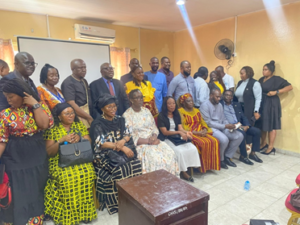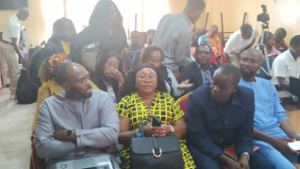Abuja Declaration target of 15 percent of national budget to health
As part of their commitment, to increase advocacy on immunization and primary health care and the general health and wellbeing of Sierra Leoneans, Hon Members of Parliament, and Civil Society Organization EPI under the Ministry of Health and Sanitation, have calls on the Ministry of Finance and other partners to increase allocation to domestic budget financing.
The objective of the discussion was engage Government, particularly the Ministry of Finance, to strengthen its commitment to increasing domestic financing for immunization, with a particular emphasis on co-financing arrangements between the Government of Sierra Leone (MoF) and Gavi.


This was made known during a one day advocacy meeting organized by Health Alert and the WASH-Net with support from GAVI, at the Conference Hall of Christian Health Association (CHASL), Brookfield in Freetown.
Giving a background of the meeting, the Executive Director of Health Alert, Victor Lansana Kororma underscored the importance of the meeting and noted that the advocacy is for specific budget domestic fiancé and immunization. He recalled how the percentage on domestic budget has been fluctuating which he said is a calls for a concern for CSO. He said to enhance the process, there is a need to partnership between government and GAVI is co-financing, cited other countries who are far ahead in domestic Financing and immunization.
In her keynote address, the Chairperson for Parliamentary oversight Committee on Health Hon Wuyata Songa lauded the significance of the need for increase allocation to not only immunization but health sector as whole. She recalled how the advocacy started on immunization and thanked Dr Moses Kangbai and other in the ministry of health for their support. She explains the yearly drop down of budget allocated to immunization since 2022 to date. She pledges commitment on behalf other members of parliament in support of the process, noting that supporting immunization is a direct support to save lives.
In his presentation, the CEO of WASH-Net, Musa Ansumana Soko said as part of their advocacy drive, they have developed a comprehensive policy brief with demands that need to be address by Ministry of Health and that of the Ministry of Finance.
He said in sustaining immunization gains in Sierra Leone, CSO’S and Parliamentarian have Calls to Priorities Co-Financing Commitments through Domestic Action. He noted that
Sierra Leone has made remarkable progress in protecting child health through routine immunization.
He added that as a country, there is an achievement of over 90 percent coverage of the third dose of the diphtheria, tetanus, and pertussis-containing vaccine (DTP3), a key indicator of immunization system performance. He pointed out that the birth cohort of 258,903 and an estimated 245,453 surviving infants each year and that the level of coverage represents a major public health achievement.
He said despite that progress, the country continues to grapple with high infant and under-five mortality rates; 76 and 100 deaths per 1,000 live births respectively, underlining the importance of sustaining and expanding immunization access. He said Sierra Leone’s immunization programme remains vulnerable due to persistent delays in meeting its Gavi co-financing obligations adding that the shortfalls is driven in part by weak domestic resource mobilization and underfunding of the Ministry of Health and its Expanded Programme on immunization (EPI) that has threaten to undermine the hard-won progress of the past decade.
He said inadequate domestic resource mobilization continues to limit fiscal space, and health sector allocations remain well below global commitments such as the Abuja Declaration target of 15 percent of national budgets to health. Within that limited space, EPI programming struggles to receive consistent prioritization. Without decisive domestic financing, Sierra Leone risks reversing immunization gains and weakening its public health system.
He stated that Sierra Leone’s immunization system is successfully reaching most children, but continued success depends on consistent and timely financing, delays carry real health risks: Missed or delayed payments can lead to vaccine shipment delays, interrupted outreach services, and rising cases of preventable disease, especially in hard-to-reach areas. He cited that the FY26 budget process presents as a unique opportunity to align national plans with real financing
He there for recommends that the Ministry of Finance should priorities and fully disburse all co-financing obligations for FY25 and integrate upcoming obligations into the FY26 national budget with a protected line under the Ministry of Health, recognize immunization and primary health care as development investments rather than routine expenses, and scale up allocations accordingly.
Improve coordination with the Ministry of Health and Local Councils to support timely planning and forecasting for immunization expenditure and the Ministry of Health, submit a strong, evidence-based proposal during the FY26 budget process that reflects the full scope of immunization and PHC needs.
Other recommendation was to engage Parliament, the Ministry of Finance, and other key ministries early to ensure alignment and build support, promote transparency and open communication with civil society, communities, and oversight actors to strengthen trust and track progress on immunization financing.
Other speaker present who made positive contribution includes, the health Economics and Health Financing in the ministry of Health, Dr Abdul J Naji, Programme Manager for Expanded Programe on Immunization(EPI), Dr Desmond Kangbai and host of Hon Members of Parliament who also added their valuable contribution.